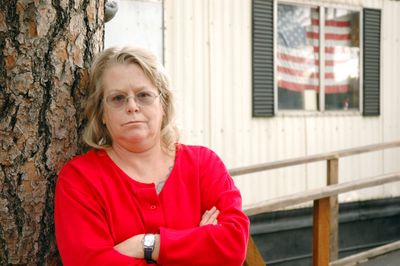Bill eases voting obstacle for felons
They could register before paying debts

OLYMPIA – For tens of thousands of convicted felons in Washington state, only one thing stands between them and the ballot box: debt.
Under current law, felons can’t vote until they have served their sentences, including the completion of any parole or probation, and paid all restitution and other court fees.
A measure to remove that payment requirement – opponents say it’s akin to a modern-day “poll tax” – has passed the House and awaits action in the Senate. If it becomes law, felons could simply re-register to vote once they’re no longer in state custody, including any parole or probation.
“The basic unfairness is that our system is currently based on someone paying off their legal obligations,” said Rep. Jeannie Darneille, a Tacoma Democrat who sponsored the measure. “If you have money, you can get your rights restored, and if you don’t have money, you won’t.”
Oregon automatically restores voting rights to felons once they’re released from prison. Nearly 40 other states and the District of Columbia also have less onerous restrictions on restoring voting rights to felons.
But others argue Washington state is obligated to make sure felons complete their entire sentence, including all monetary obligations.
“Until they pay their fines and restitution, to me, they haven’t carried out their entire sentence,” said Rep. Ed Orcutt, a Kalama Republican who opposes the bill. “So their voting rights shouldn’t be restored.”
Sen. Jeanne Kohl-Welles, a Seattle Democrat who sponsored a similar measure in the Senate, said felons will still need to pay off their debts, but won’t have to wait to vote while they’re doing so.
“It’s more an issue of fairness,” she said. “I don’t think the right to vote should be based on one’s income.”
Similar bills have been raised here before, but this is the first time the measure has gotten any traction. It passed the House on a 53-43 vote earlier this month, and has a public hearing Monday morning before the Senate Government Operations and Elections Committee.
Secretary of State Sam Reed, the state’s top elections officer, had not taken a position on the measure in the past, but this year he publicly supports it, saying the bill could foster greater civic engagement.
“When people have served their time and are out of prison, we want them to get involved in their community and get connected,” said Reed, a Republican.
Equally important, Reed said, the measure would help reduce the bureaucratic challenges in determining who is a legal voter.
The state’s voter database is able to track people who are currently in prison, or who are still under supervision by the state Department of Corrections. More than 12,000 felons have been removed from the rolls since the database went online in 2006. But people who haven’t yet had their rights restored, often because of unpaid court-ordered fines, are harder to track.
“It continues to be a problem,” Reed said. “We really need a bright line.”
It is unclear exactly how many people previously convicted of felonies are barred from voting in Washington solely because they haven’t paid their fines. A 2002 estimate calculated the figure at more than 46,000 people, but state elections officials say the actual number is impossible to know, because there’s no list of people who are no longer in the DOC system, but still owe legal financial obligations.
“There is no source of information that provides all of the people who are ineligible,” said Katie Blinn, Reed’s assistant director of elections.
In 2006, a King County judge ruled that felons cannot be barred from voting just because they owe fines. The following year, the state Supreme Court overruled him, saying that the law did not illegally discriminate against poor felons who have trouble paying their legal bills.
The ACLU had sued on behalf of three convicted felons in that case, including Beverly DuBois, of Chattaroy, who was convicted on a marijuana charge in 2002. The $10 per month she has been paying since her release in 2003 doesn’t cover the interest, and she said her $1,600 fine has increased to nearly $2,000.
“This last election, I was just beside myself because I couldn’t vote,” said DuBois, who was disabled after a car accident and can’t work. “It’s terribly frustrating.”
An estimated 5.3 million people nationwide are ineligible to vote because of a felony conviction, according to the Sentencing Project, an advocacy group in Washington, D.C.
“People want there to be consequences for committing a crime. But certainly once the sentence has been completed, there’s not that many people who think this should be a lifetime punishment imposed on you,” said Marc Mauer, executive director of the advocacy group.
Gov. Chris Gregoire, a Democrat, said she generally supported the idea.
“I do not have an objection for restoration of voting rights simply because they haven’t paid a fine,” she said. “I don’t want to create a debtor’s prison.”
In a joint newspaper column last month, former Seattle Police Chief Gil Kerlikowske and Snohomish County Sheriff John Lovick wrote that financial obligation should not be a barrier to being able to vote.
“Voting is an important way to connect people to their communities, which in turn helps them avoid going back to crime,” they wrote. “We want those who leave prison to become productive and law-abiding citizens. Voting puts them on that path.”